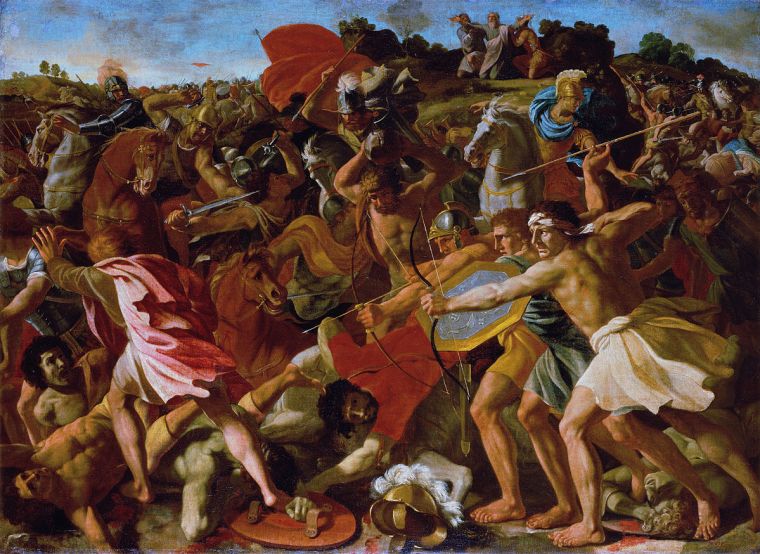Judging Jericho: What should Christians do with the Bible's God-ordained violence?
Leading on a Christian youth summer camp this year, I was a little thrown when I heard the Bible text we'd be exploring for the week: the Old Testament book of Joshua.
'Ah', I thought, 'Joshua: the one with the God-ordained genocide! Perfect for the kids.'
I confess I was relieved not to be preaching that week. But that's odd isn't it? Even having studied theology, there's parts of Scripture that I try and keep my distance from. I rather enjoyed the Veggie Tales depiction of Joshua's destruction of the Canaanite city of Jericho, featuring an animated army of singing French peas felled by the faith of a trumpeting cucumber. It was formational!
But now a little older and more aware of how a theologically-charged obsession with race and territory can be a source of tragic destruction across the world, I'm not so comfortable.

Let's be clear, this isn't the case for taking scissors to Scripture and cutting out the bits we don't like – nor am I suggesting that there's a villainous 'Old Testament God' who delights in genocide but thankfully gets replaced by the meek and mild Jesus of the New Testament.
However, stories like Joshua are an inescapably difficult read: utter destruction, a command to kill and plunder from a foreign nation, and the troubling idea that racist violence is okay if 'God is on your side'. At least, it can feel like that's what is going on. Can the stories be explained? It's a complex problem not simply solved, but there are good ways and bad ways of reading these stories. If we can discern them, they may help us solve the puzzle of Old Testament violence, and the real question we're probably asking: 'what is God like – is he good?'
So, to focus it: why did God have to destroy Jericho? A recent book offers fresh insight on the question: Joshua Ryan Butler's The Skeletons in God's Closet is an important work that I've praised before as a highly accessible and thoughtful take on questions many might rather avoid, which makes the radical case for the 'hope of holy war'.
Butler, drawing on scholarship, makes helpful points particularly surrounding the language that's used in Joshua. Firstly, he says, we should imagine in Jericho not a 'civilian population centre' but a 'military stronghold'. That's what the Hebrew word for 'city' ('ir) would have meant to readers – a first line of defence that protected the civilians who were further beyond, not their actual home. Archaeology – and some complications in translating numbers – suggest Jericho itself was probably just a garrison for no more than 150 soldiers. As Butler puts it, this is the demise of a fort, not a 'civilian massacre: God is pulling down the Great Wall of China, not demolishing Beijing'.
Then again, don't some of God's commands imply indiscriminate mass-slaughter? After all Moses and Joshua were given the grim commission to 'utterly destroy them' and 'show no mercy'. But, Butler posits, Military 'trash talk' was popular in ancient Middle Eastern society and literature: energetic hyperbole used to emphasise devastating military prowess, but not necessarily detail specific casualties.
It's not unlike the rhetoric used in popular sport: Manchester United weren't actually 'annihilated', they just lost 3-1. It was bad, but they will be back next week. Studies show it was true in ancient military accounts – when a mighty reputation was key for tribal survival. Scripture itself talks about Canaanites being totally wiped out, before they inevitably reappear in the chapters and books that follow. To admit this style is simply to accept that Bible-writers used the literary conventions of their day, and means the conquests of Joshua may not be on the scale we've imagined.
A third point is a more theological and narratival one: when it comes to divinely-mandated military conquest in the Old Testament, the focus is almost always not on military expertise, but how God fights and wins the battle, defending the underdog of Israel against the odds. It's for this reason that Israel is continually commanded not to have a private army nor invest in military might. God wanted to cultivate faith, not a culture of war. This means the focus is not on merely violent, aggressive nationalism, but a personal, merciful creator God who can't be controlled – but can be trusted to be just.
It doesn't mean there's no blood or troubling questions, but it changes the perspective. If it's specifically God who wins the battle, then the tales of Joshua can't be simply used to justify contemporary nations who reckon God is 'on their side'. It might help us wrestle with the ethics of conquest, if we can trust that God is not a violent maniac but only ever does what is right.

Some may still recoil at these 'mitigations' – it's worth noting that this brief summary can't do them full justice – but these questions are at the very least worth engaging. It might be tempting to completely reject the stories we find tough in Scripture, but if I'm honest if I took that approach to the Bible, there wouldn't be a lot of it left. A story made purely in our own image – what we'd like to see – may be momentarily pleasing but is ultimately shallow and all too familiar. The story we didn't write offers more honesty, more challenge, more to see that we don't yet understand.
Our world is one still constantly at war, and I'm glad that Scripture witnesses to the painful reality of conflict. We see that God has a part in it, but that ultimately his vision is not war but peace: in Christ we meet God's son and Messiah who shows the way not of the warmonger but of the self-giving lamb. He doesn't come to erase the stories of old, though perhaps he does come to redeem them, to show that violence is not ultimately 'good' (though at times it might be needed), nor the last word for the world. New Testament scholar Preston Sprinkle's book Fight offers an engaging survey of Scripture that makes a case for Christian non-violence today, with the Prince of Peace at its heart.
These ancient tales can trouble because they make us wonder what God is like – a crucial question indeed. We're also conscious of our own bloody context – when we look to God we want not more of the same but a way out from war. There are good scholarly arguments that help us see beyond popular caricatures and listen to the actual story, one that's more subtle and complex than we might think.
For example the book of Joshua presents one graphic tale of the King of Ai (Joshua 8:1-29), the leader of the city Israel fells after taking Jericho. When defeated, the King of this city is impaled and hung up on a pole outside Ai, a representative of its decline.
Christians worship a King who was also hung up outside a city in what his enemies saw as a public symbol of his (and his nation's) utter defeat. But there was more going on than they could see. In this dead King lay a powerful paradox: a hope that embraced life's violence but wasn't resigned to it, and would ultimately redeem it.
You can follow @JosephHartropp on Twitter











